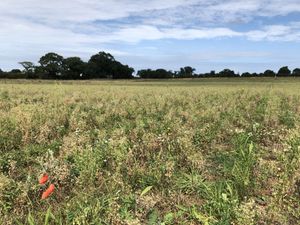Growing cover crops to prevent bare fields helps soil and wildlife – study
Research into regenerative agricultural practices found the clearest benefit for minimising bare soil.

A shift away from the familiar sight of bare winter fields can help improve soils and boost wildlife, a study suggests.
An assessment of “regenerative agriculture” – which focuses on improving soils, producing food and increasing farmland wildlife – found good evidence that minimising bare soils, for example by growing cover crops on land over winter, had benefits for soil health and nature.
But there was less evidence from the UK-focused study around benefits from “no-till” or “minimum-till” practices which limit the disturbance of the soil from ploughing, despite their prominence in regenerative agriculture.
There was a more positive impact found from integrating livestock into arable fields – for example growing cover crops that sheep could then graze on – in suppressing weeds, disease and pests, and boosting yields.
Reducing inputs such as pesticides had both environmental and economic benefits, with improvements in natural services potentially offsetting reduced yields, the report found.
Overall the study suggested a “whole systems approach” was needed in the transition to regenerative agriculture, with individual measures implemented in isolation rarely sufficient to deliver the environmental benefits of the approach.
But lead report author Dr Lucie Buchi said that should not discourage farmers from implementing certain measures that work on their farms, saying “people need to start somewhere”.
The report from the British Ecological Society was drawn up by a team of more than 40 ecologists, with contributions from farmers across the UK.
Dr Roy Neilson, soil ecologist at the James Hutton Institute and lead author on the report, said: “In terms of the UK, the strongest evidence we assimilated was that where possible minimising bare soil would have the greatest impact especially in the context of utilising a cover crop which would have a range of benefits such as reduced soil erosion, increased biodiversity and improved soil health.”
He also said there were significant gaps in evidence in regenerative agriculture, particularly on how different measures worked together, with more research needed to support the sector in the UK.
Dr Buchi, researcher in crop and weed ecology at the Natural Resources Institute at the University of Greenwich, said: “Moving from one farming system to another is complex, difficult and risky.
“A whole systems approach is an ideal end goal, but this shouldn’t discourage farmers from picking up certain regenerative agriculture elements that they can implement on their farms.”
“People need to start somewhere,” she added.





